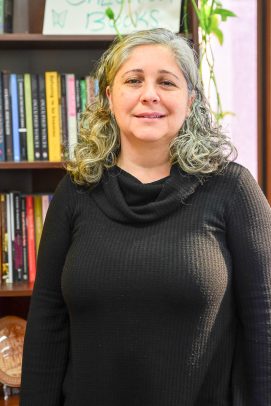Arab American Cultural Center director eager to chart new territory
Zeina Zaatari wasn’t looking for a job when she learned about an opening at the UIC Arab American Cultural Center, the newest group to join the Centers for Cultural Understanding and Social Change.
“I liked where I was working,” said Zaatari, who was a research director at the liberal think tank Political Research Associates. “But I started thinking about the possibility.”
She thought about UIC’s social justice commitments and what it would mean to be part of the first Arab American Cultural Center on a U.S. college campus. Then, she remembered how, as a graduate student at Iowa State University and later a Ph.D. student at the University of California Davis, she had wished for a place that resembled the Arab American Cultural Center, a place she and her peers believed would never even be possible.
“It felt like an opportunity I couldn’t miss,” she said.
So, in January, Zaatari began her role as the director for the Arab American Cultural Center, and with years of experience in leading and creating new programs under her belt, she’s ready to grow the group’s commitment to the campus community — charting new territory along the way.
“I’m trying to learn more from the students, staff, faculty, and community organizers, to better understand the set of relationships and dynamics and the students’ needs on campus,” Zaatari said, describing her first month on the job.
Before coming to UIC, she was an adjunct faculty member for the University of California, Davis; San Francisco State University; and other schools.
Her other roles in academic and nonprofit spheres, work she has done for more than 20 years, have focused on gender and racial justice in Arab and Arab American communities.
That experience will help her plan for what’s next at the Arab American Cultural Center, which was founded at UIC in 2016.
“We’re currently thinking through what kinds of programming to offer, learning from what has been done so far,” said Zaatari.
She shared that the center will continue to have important educational events, where Arab American, Muslim and other students can learn about the histories and cultures from different regions, diasporas and immigrant communities.
Zaatari offered an example of when that educational opportunity might help.
“There are a lot of Palestinian students on campus, many who may not be aware of what’s happening in other places in the region and the challenges folks may be facing, so we have an event on Yemen and another on what is happening in Sudan,” she said.
Students can also expect to engage in conversations and collaborations with classmates and staff from the six other cultural centers on campus, starting as soon as next month.
For International Women’s Day, the center, with sponsorship from the Women’s Leadership and Resource Center and the Gender and Women’s Studies Program, will organize a symposium March 4 and 5.
Future events will build on work already done by the center. That includes hosting workshops made to help people understand who Arab, Arab American and Muslim Americans are.
“It’s important to be challenged in our assumptions, engaging with students from diverse backgrounds and other cultural centers as well because that experience is invaluable for what comes next in students’ lives,” she added.
One thing will remain unchanged, though. The center will always be a welcoming place for all students.
“We’ll continue to strive to make sure the center is a safe and inclusive space,” she said.

